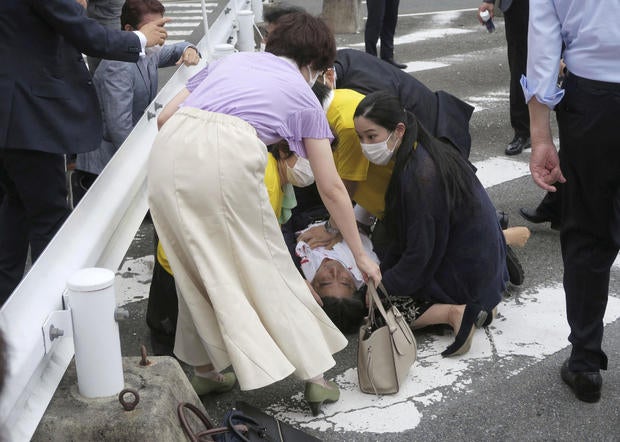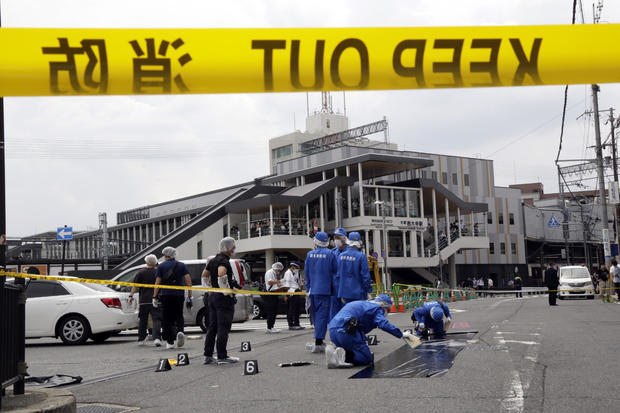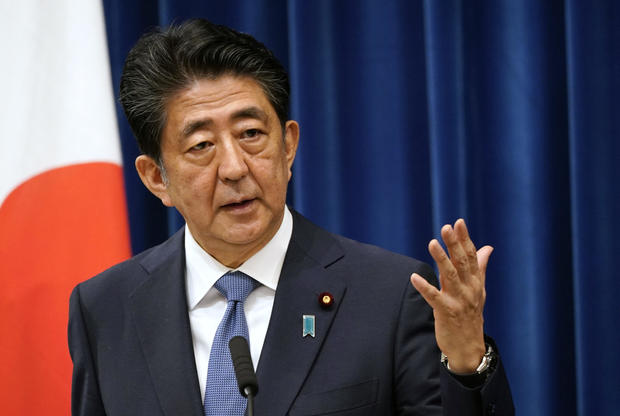Japan’s former Prime Minister Shinzo Abe was shot as he gave a campaign speech on Friday in western Japan and airlifted to a hospital. Local fire department official Makoto Morimoto said Abe was in cardio and pulmonary arrest, or CPA, meaning he was not breathing and his heart stopped during the airlift.
Chief Cabinet Secretary Hirokazu Matsuno told reporters that police had arrested a male suspect at the scene of the attack.
“A barbaric act like this is absolutely unforgivable, no matter what the reasons are, and we condemn it strongly,” Matsuno said.
Japan’s public broadcaster NHK aired video of Abe collapsed on the street with several security guards running toward him. He was reportedly shot a few minutes after he started talking outside a train station in western Nara. In videos posted to social media at least two apparent gunshots can be heard as a man resembling Abe speaks, and a white plume of smoke is seen behind the former prime minister.
According to Japan’s Kyodo news agency, Abe sustained gunshot wounds to his neck and chest.
NHK, quoting multiple military sources, said the suspect was employed for three years in Japan’s Maritime Self-Defense Force, until 2005. The network described the weapon used in the attack as homemade. Police said the suspect had told them he was dissatisfied with Abe and wanted to kill him.
Other videos posted online show campaign officials surrounding Abe in an apparent attempt to treat the popular former leader, who is still influential in the governing Liberal Democratic Party and heads its largest faction, Seiwakai. Elections for Japan’s upper house, the less powerful chamber of its parliament, are Sunday.
Prime Minister Fumio Kishida, who belongs to the same political party as Abe, was on his way to Tokyo on a helicopter from his own campaign destination of Yamagata, in northern Japan. Matsuno said all Cabinet ministers were to return to Tokyo from their campaign trips.
The attack was a shock in a country that’s one of the world’s safest and has some of the strictest gun control laws anywhere.
The term heart failure means the heart cannot sufficiently pump blood and supply necessary oxygen to the rest of the body. In Japan, officials sometimes use the term to describe situations where victims are no longer alive but before a formal declaration of death has been made.
“We are all saddened and shocked by the shooting of former Prime Minister Abe Shinzo,” U.S. Ambassador to Japan Rahm Emmanuel said on Twitter. “Abe-san has been an outstanding leader of Japan and unwavering ally of the U.S. The U.S. Government and American people are praying for the well-being of Abe-san, his family, & people of Japan.”
During a visit to Indonesia, U.S. Secretary of State Antony Blinken said he was “deeply saddened about the shooting.”
“We don’t know his condition. Our thoughts, prayers are with him, his family, and the people of Japan. Very sad moment,” said the top U.S. diplomat.
Abe, 67, was Japan’s longest-serving prime minister. He resigned in September 2020 due to health problems. Abe said at the time that he was suffering from a recurrence of the ulcerative colitis that brought an end to his first term in 2007. He told reporters it was “gut wrenching” to leave many of his goals unfinished and spoke of his failure to resolve the issue of Japanese abducted years ago by North Korea, a territorial dispute with Russia and a revision of Japan’s war-renouncing constitution.
That last goal was a big reason he was such a divisive figure.
His ultra-nationalism riled the Koreas and China, and his push to normalize Japan’s defense posture angered many Japanese. Abe failed to achieve his cherished goal of formally rewriting the U.S.-drafted pacifist constitution because of poor public support.
Supporters of Abe said that his legacy was a stronger U.S.-Japan relationship that was meant to bolster Japan’s defense capability. But Abe made enemies too by forcing his defense goals and other contentious issues through parliament, despite strong public opposition.
Abe is a political blue blood who was groomed to follow in the footsteps of his grandfather, former Prime Minister Nobusuke Kishi. His political rhetoric often focused on making Japan a “normal” and “beautiful” nation with a stronger military and bigger role in international affairs.




